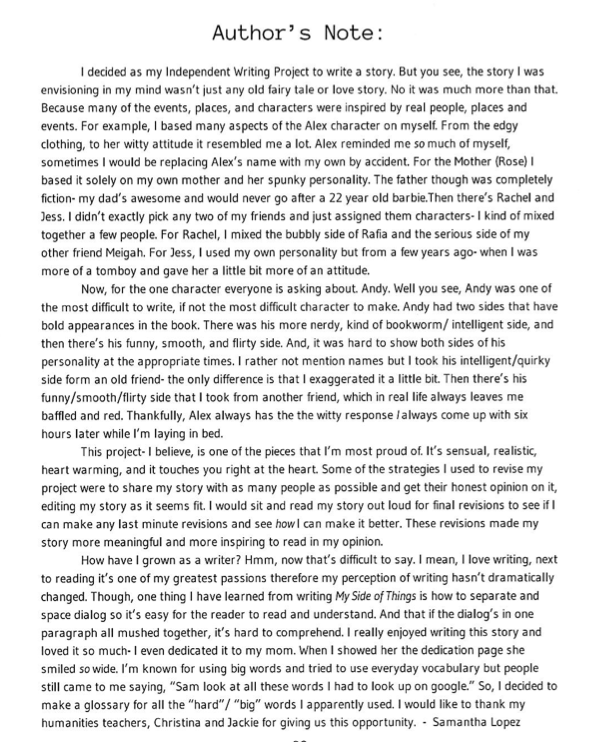writing your author's note
WHAT IS AN AUTHOR'S NOTE?
An author’s note is an opportunity for you to speak directly to your readers about your work. It explains what you created and why you made it. It should also contain a reflection on what you have learned and how you have grown as a writer. The author's note is NOT something that should be written quickly; rather, it is an essential component of your project that should take a great amount of time and reflection.
WHY IS AN AUTHOR'S NOTE IMPORTANT?
Author's notes are very often a requirement of exhibition, professional representation, and promotion. It is also a great opportunity for you to address your audience directly. It helps to create a connection between your writing and the reader, which will make your work more memorable and more meaningful.
Last but not least, an author's note is important for YOU, as the author. Writing official statements gives you another way to reflect on your work and the purpose for which you made it. It is a reminder of your values and the decisions you made throughout the creation process.
HOW FORMAL SHOULD AN AUTHOR'S NOTE BE?
Your author's note should NOT sound too rigid or too formal. It should be written in the first person point of view (i.e. using personal pronouns like “I” and “my”) and you should act like you are speaking directly to the audience (which you are!). That being said, however, you still want to make sure you are being professional (no slang). It should feel just familiar enough so that your readers feel some sort of connection to you and your work.
guidelines
You should include at least 4 sections in your author's note:
1st Section: Organizing Idea
2nd Section: Features of the Genre
3rd Section: Revisions
4th Section: Conclusion
1st Section: Organizing Idea
- Explain your idea or topic and why & how you chose it
- Talk about your inspirations (Did you use any model texts? Were there specific people or ideas that inspired you?)
- What does your work mean to you?
2nd Section: Features of the Genre
- Name some features that you used in your project that are common to the genre you are writing in (e.g. literary devices, headings & subheadings, literary elements, etc.)
- How do these features add or contribute to your work? How does it make it better? Why are they important?
3rd Section: Revisions
- Talk about strategies you used to revise your project
- Explain how revising improved your work and made it more meaningful
4th Section: Conclusion
- How have you grown as a writer? (Think about the entire process of creating your work, what you are proud of, important things you have learned, and/or how you or your perception of writing has changed.)
- Include anything else readers should know about you as a person or writer.


